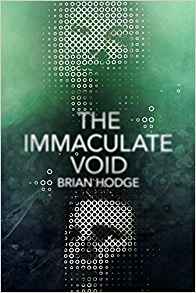John Langan Reviews The Immaculate Void by Brian Hodge
 The Immaculate Void, Brian Hodge (ChiZine 9781771484374 $17.99, 232pp, tp) May 2018.
The Immaculate Void, Brian Hodge (ChiZine 9781771484374 $17.99, 232pp, tp) May 2018.
For the last several years, Brian Hodge, always one of his generation’s leading writers of horror, has been having something of a renaissance, writing stories which have been among the highlights of anthologies including The Mammoth Book of Cthulhu, Children of Lovecraft, and The Devil and the Deep. The Immaculate Void, his gripping new novel, has its origins in his forthcoming collection of those recent stories, Skidding Into Oblivion (due in 2019). Intended as an original piece for the collection, the narrative grew into a short novel. It’s a fine display of Hodge’s skills as a writer, particularly his ability to combine the cosmic and the personal, the sublime and the intimate.
The novel begins by discussing a pair of anomalies in the solar system. First, a comet strike on Jupiter leaves no trace on the gas giant’s roiling clouds, which is unusual, but not as much so as the subsequent event, the impact of another comet on Jupiter’s moon, Europa, after which, the satellite contracts and disappears. Strange and ominous, the occurrences look back to the history of comets as bad omens, but through the lens of early 21stcentury astronomy.
From there, the novel moves to the story of two siblings, Tanner and Daphne Gustafson. Tanner, who works in alpine rescue, is trying to locate his sister, from whom he has not heard in a while and whose most recent roommate is looking for her, to pay her half of the rent on the house they have been sharing. Searching for Daphne is a regular task for Tanner, as his sister is prone to erratic behavior, a consequence of childhood trauma for which Tanner feels partially responsible. His latest investigation starts at the door of the man who contacted him about the missing rent. Older, ineffectual, Val admits Tanner to the house so Tanner can search his sister’s belongings. Among them, Tanner finds a number of cell phones, which Tanner collects in a basket and two of which Val grabs from him and attempts to swallow, succeeding— impossibly—with the first. After Tanner has subdued him, Val speaks to him as if from a great distance, gazing out upon celestial vistas, until he suddenly deliquesces. Tanner calls the emergency services, who quarantine him for a short time, fearing an incidence of biological or chemical attack. While under observation, Tanner searches the remainder of his sister’s cell phones, which after he has been released lead him to Attila, Daphne’s partner before Val. A giant of a man, fearsomely strong and charismatic, Attila remains interested in Daphne in a way that makes her brother distinctly uneasy. Attila and Tanner engage in verbal sparring, which is prologue to actual, bloody combat, which ends with Tanner subdued and unconscious, Attila’s prisoner.
Even as Tanner’s story has been moving from bad to worse, we’ve also been following Daphne’s narrative, hearing the story of her dramatically horrifying childhood. When she was a young girl, Daphne was kidnapped by Wade Shavers, a serial killer from whom she was rescued only at the last moment, though not before she learned that the man was targeting specific children. Subsequently, she would discover that his victims had had weird, inexplicable memories, as if they were remembering not just another life, but another kind of existence altogether. Her abduction has left her suffering ongoing PTSD that has made of her life a difficulty. To make matters worse, for some time now, Daphne has been receiving phone messages from a mysterious source. Their content is always the same: there are people she may and should kill, people she alone is capable of recognizing, and if she does this, then she will be immortal. Were it not for the facts that Tanner listens to the recordings, and, we learn, that Attila has, as well, we might take them as the symptom of a mind permanently injured. As it is, they point in directions larger and more sinister.
Tanner is now imprisoned by Attila in a subterranean basement with a door that opens to somewhere else, what Tanner realizes is the gullet of a vast, alien lifeform. Daphne, in the meantime, has become friendly with Bianca, a woman who is the adult version of the weird children whose fate she so narrowly escaped. Daphne is swept by contradictory emotions toward her friend, feeling simultaneously close to and as if she could murder her. Her rescue from Wade Shavers years before, it seems, came too late, after she had been infected with the same change in perception that drove him to his depravities. While she struggles against her homicidal impulses and attempts to learn more about Bianca’s nature, Attila explains to Tanner his interest in his sister. According to Attila, Daphne has been selected by the gods to carry out the work of hunting a select group of people. These men and woman carry within themselves memories of lives lived in previous universes. Attila describes these people as truffles of the gods, delicacies for powers vastly more powerful than humanity, who will reward those who can bring them what they crave.
Attila, however, has misunderstood the nature of the gods’ interests in what he and Daphne both call the atavists. Rather than desiring these figures, the gods fear them. Because of their connection to a previous cosmos, the atavists jeopardize the stability of this one, in which the gods have their power and to which they and their power are confined. Should three or four atavists come together, their proximity will disturb the integrity of the universe in dramatic fashion; should more than that assemble, it will precipitate the apocalypse, undoing the universe in order that it may start again. Brutal, blood-soaked, Hodge’s gods seek to maintain their position through slaughter. Attila is partially correct, though, as the gods will reward any, such as Daphne, who will seek out and destroy whatever atavists they can.
Hodge concludes his novel by taking us all the way to and into the end-of-universe scenarios so many narratives of cosmic horror threaten. Even here, though, as the Earth is torn asunder and the stars wink out, he maintains his focus on the human, employing the personal to render the infinite relevant, affecting. Earlier in 2018, Hodge published an excellent novella, I’ll Bring You the Birds from Out of the Sky, which concerned an effort by a dealer in folk art to discover a missing piece of artwork, and with it, gain insight into the artist’s creativity. His search led him to a mountain village overrun by a vast fungus, an alien consciousness infecting those who come into contact with it, granting one man astonishing artistic visions in the process. In its blending of the humane and the sublime, the novella is of a piece with The Immaculate Void, and together, the books suggest one reason for Hodge’s success, namely, that the mirror in which the galaxy swirls is a human eye.
John Langan is the author of two novels, The Fisherman (2016) and House of Windows (Night Shade 2009), and two collections of stories, The Wide Carnivorous Sky and Other Monstrous Geographies (2013) and Mr. Gaunt and Other Uneasy Encounters (2008). With Paul Tremblay, he co-edited Creatures: Thirty Years of Monsters (2011). One of the founders of the Shirley Jackson Awards, he served as a juror for its first three years. He lives in New York’s Mid-Hudson Valley with his wife and younger son.
This review and more like it in the November 2018 issue of Locus.
 While you are here, please take a moment to support Locus with a one-time or recurring donation. We rely on reader donations to keep the magazine and site going, and would like to keep the site paywall free, but WE NEED YOUR FINANCIAL SUPPORT to continue quality coverage of the science fiction and fantasy field.
While you are here, please take a moment to support Locus with a one-time or recurring donation. We rely on reader donations to keep the magazine and site going, and would like to keep the site paywall free, but WE NEED YOUR FINANCIAL SUPPORT to continue quality coverage of the science fiction and fantasy field.








